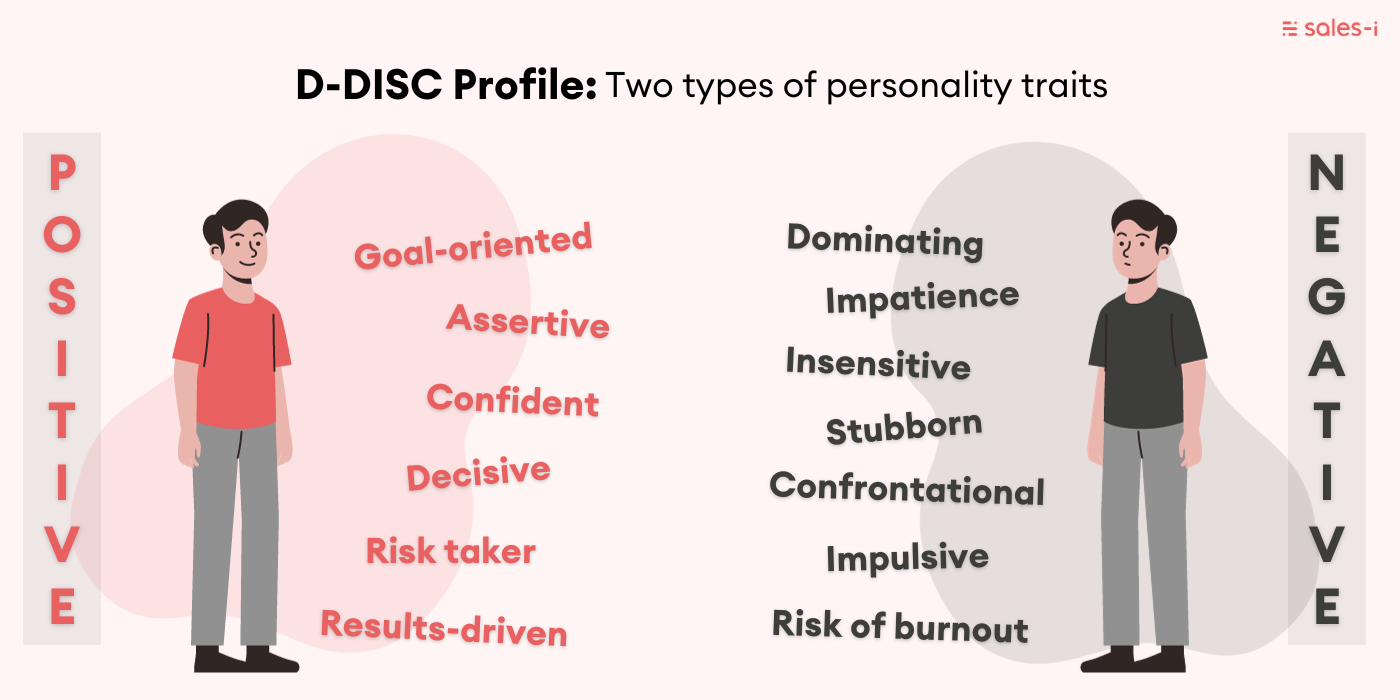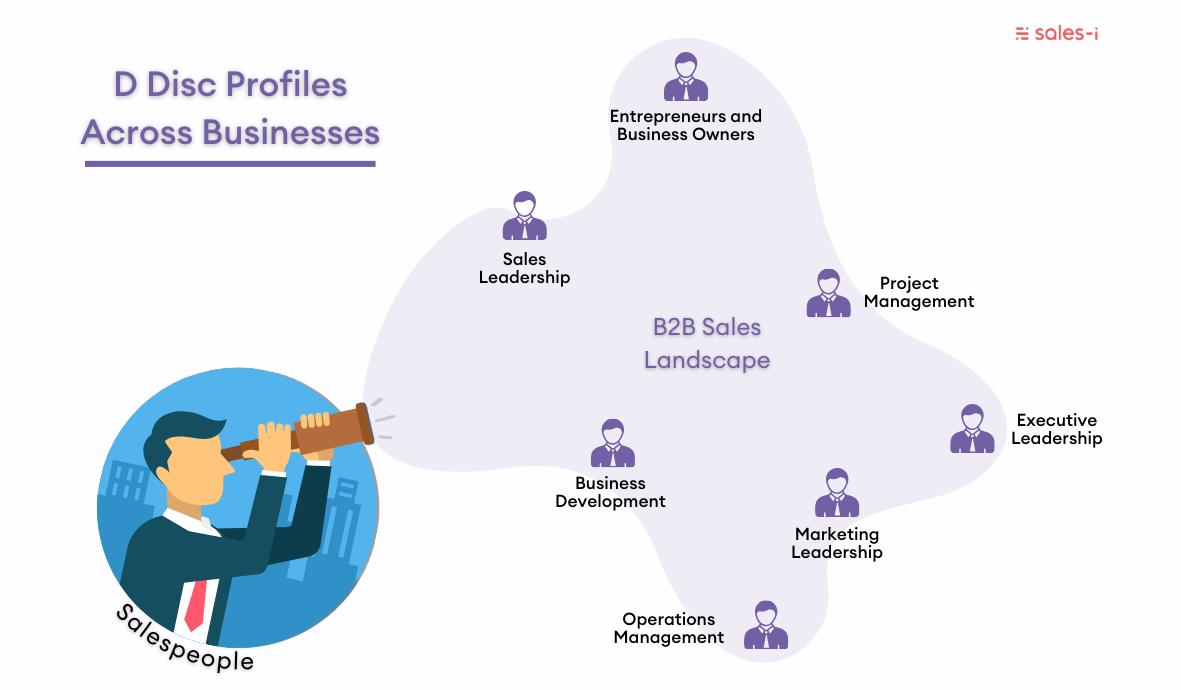In the world of B2B sales, understanding your clients' personalities and communication styles is key to building strong relationships and closing deals effectively. One of the primary personality profiles used in the DISC assessment is Dominance.
In this blog post, we'll explore the Dominance DISC profile and how you can leverage this knowledge to drive success in B2B sales:
- What is the Dominance (D) DISC Profile?
- What are the personality traits of a (D) DISC profile?
- How to spot a (D) DISC profile
- Where to find a (D) DISC profile within a business
- Understanding how to deal with a (D) profile in B2B Sales
What is the Dominance (D) DISC Profile?
The Dominance DISC profile represents individuals who exhibit assertive, results-oriented, and often competitive behavior. They thrive on challenges, take initiative, and are driven by a desire for control and achievement. Understanding the Dominance profile can be a game-changer in the B2B sales arena.
What are the personality traits of a (D) DISC profile?
Individuals with a 'Dominance' DISC profile, often labeled as "D" in DISC assessments, exhibit a set of personality traits that can have both positive and negative aspects. It's important to note that people are complex, and these traits manifest differently in different individuals. Here are some positive and negative personality traits associated with the Dominance profile:

Positive Traits:
- Assertive: Dominant individuals are decisive and not afraid to take charge. They are proactive in their approach to challenges and are often seen as natural leaders.
- Goal-oriented: They are highly focused on achieving their goals and are willing to put in the effort to make things happen. Their determination often leads to success.
- Confident: Dominant personalities tend to exude confidence, which can inspire trust and motivate others to follow their lead.
- Results-driven: They have a strong desire to see tangible results, which can lead to efficient problem-solving and a focus on productivity.
- Risk takers: Dominant individuals are often willing to take calculated risks to achieve their objectives, which can lead to innovation and progress.
- Decisive: They make decisions quickly, which can be beneficial in situations where prompt action is required.
Negative Traits:
- Dominating: The assertiveness of Dominant personalities can sometimes come across as domineering or controlling, which may alienate others.
- Impatience: Their desire for results can lead to impatience, making them less tolerant of delays or setbacks, which can create tension in team dynamics.
- Insensitive: Dominant individuals may prioritize goals over people, which can lead to insensitivity toward the feelings and needs of others.
- Stubborn: Their determination to achieve their goals can sometimes manifest as stubbornness, making them resistant to considering alternative viewpoints or strategies.
- Confrontational: Dominant personalities may be more likely to engage in confrontations or conflicts, especially when they perceive a challenge to their authority or goals.
- Impulsive: Their quick decision-making can sometimes lead to impulsive choices, which may not always be well thought out.
- Risk of Burnout: Their relentless pursuit of goals and the willingness to take on numerous responsibilities can lead to burnout if not managed properly.
It's important to recognize that these traits are not inherently good or bad; they simply reflect different aspects of a person's personality. In a work or team environment, individuals with 'Dominance' traits can be valuable leaders and problem-solvers, but it's crucial to balance these traits with effective communication and interpersonal skills to foster positive relationships and collaboration.
How salespeople can spot a prospect with a (D) DISC profile?
Here are some of the most common signs to help you identify prospects with a D DISC profile:
- Assertive and confident.
- Fast-paced.
- Impatient.
- Efficient, not neat.
- Likes to stand in meetings.
- Lots of hand movements and big gestures when talking.

Where to find D DISC prospects within a business?
Individuals with a Dominance DISC profile are often drawn to and excel in various business functions and roles that require assertiveness, leadership, and a results-oriented approach. While the specific roles can vary, here are some business functions that are typically seen as the 'Dominance' DISC personalities:- Sales Leadership: Sales managers and directors often exhibit 'Dominance' traits as they need to lead their teams, set ambitious targets, and drive results.
- Entrepreneurs and Business Owners: Many successful entrepreneurs possess 'Dominance' traits. They have a vision, take calculated risks, and are determined to achieve their business goals.
- Executive Leadership: C-suite executives, such as CEOs and COOs, often have Dominance profiles as they are responsible for making critical decisions, setting strategic direction, and ensuring the organization's success.
- Project Management: Project managers with Dominance traits are known for their ability to take charge, set project goals, and lead teams to complete tasks efficiently and on time.
- Operations Management: Operations managers oversee the day-to-day functioning of a business. Dominant individuals excel in this role as they can make quick decisions and implement processes to improve efficiency.
- Marketing Leadership: Marketing directors and managers may exhibit 'Dominance' characteristics as they set marketing strategies, define goals, and drive campaigns to achieve measurable results.
- Business Development: Professionals in business development roles often need Dominance traits to identify opportunities, negotiate deals, and drive revenue growth.
It's important to note that individuals can have a blend of personality traits from various DISC profiles, and one's suitability for a role depends on a combination of traits, skills, and experience. Moreover, diversity in personality profiles within a team can be valuable, as it brings different perspectives and strengths to the table, contributing to a well-rounded and effective organization.
Understanding how salespeople can deal with a (D) profile in B2B Sales
Here are some strategies that salespeople can use to effectively engage with dominant clients or prospects and drive success in B2B sales:- Be Direct and Efficient
Dominant individuals value direct and to-the-point communication. When dealing with a Dominant client, avoid lengthy introductions or small talk. Get straight to the point by presenting the key benefits and value your product or service offers. Highlight how it can help them achieve their goals and solve their challenges swiftly. - Focus on Results and ROI
Dominant personalities are results-driven. They want to know how your solution will impact their bottom line. Be prepared to provide data, statistics, and concrete examples of how your product or service has delivered measurable results for other clients. Show them the return on investment (ROI) they can expect. - Emphasize Leadership and Authority
Dominant clients often respect authority and strong leadership. Position yourself as an expert in your field, and demonstrate your industry knowledge and experience. Showcase the leadership qualities within your organization and how they can benefit the client's business. - Challenge Their Thinking
Dominant individuals enjoy a good challenge. Engage in thoughtful discussions that push their boundaries and encourage critical thinking. Present alternative solutions or approaches that may appeal to their competitive nature. However, do so respectfully to avoid coming across as confrontational. - Show Confidence and Assertiveness
Confidence and assertiveness are traits that Dominant clients appreciate. Project self-assuredness in your presentations and conversations. Be ready to answer their questions with confidence, and don't be afraid to push back if you believe a particular aspect of your solution is crucial for their success. - Respect Their Time
Dominant individuals often have packed schedules and a high regard for their time. Prioritize efficiency in your interactions. Schedule meetings and calls in advance, stick to the agenda and avoid wasting their time with unnecessary details. - Provide a Clear Path to Action
Dominant clients prefer clear, actionable steps. At the end of a meeting or presentation, outline a straightforward plan of action. Define the next steps, responsibilities, and deadlines. This clarity aligns with their desire for control and helps move the sales process forward.
Understanding and effectively engaging with B2B prospects who exhibit the 'Dominance' DISC profile is a powerful tool in the world of B2B sales. By adapting your communication style, focusing on results, and providing clear and actionable solutions, you can build trust and rapport with dominant clients and ultimately drive success in your sales efforts.
Remember that every client is unique, so while these strategies are tailored to dominant personalities, it's essential to remain flexible and responsive to individual needs and preferences to achieve the best results in B2B sales.


%EF%B9%96width=1080&name=Want%20to%20find%20out%20more%20about%20how%20sales-i%20can%20mix%20your%20hard%20and%20soft%20data%20together%20(2).png)